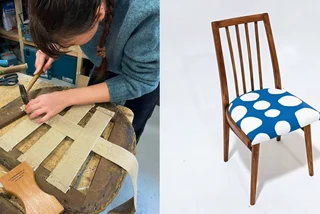For many expats moving to the Czech Republic, arranging personal finances is an immediate priority. It’s a process which can underline the daunting aspects of moving to another country; something as fundamental as setting up a bank account takes on new layers of complexity in a foreign environment where you don’t speak the language.
With expats making up a vital portion of the population of the Czech Republic, especially in major cities such as Prague, one bank provides dedicated support to foreign clients at a center staffed by multilingual experts. UniCredit Bank’s International Clients Center, located on Náměstí Republiky in central Prague, is a modern, airy and welcoming space providing a full range of banking services to help ease the transition to life in Czechia.
Trust banks and be careful with bureaux de change
According to Eva Grulichová, the head of UniCredit Bank’s International Clients Center, the first thing expats newly arrived in Czechia should understand is the advantage of dealing with banks rather than currency exchange shops.
“The exchange rate is always very important for expats; they don’t want to lose money. There are, of course, options to exchange your money either in the bank or in exchange offices, but wherever they’re located – in airports, or in town centers – exchange offices tend not to be a good option,” Eva points out.
“It’s necessary to pay close attention, because not all exchange offices are honest,” she explains. “Be aware, and check the referential exchange rate of the Czech National Bank, or another Czech bank, to ensure that you are receiving a fair offer and that the exchange office is not trying to rob you.”
While exchange offices sometimes provide poor rates compared to banks, expats should be even more wary of less legitimate currency exchange methods. “Expats withdrawing money at ATMs may be approached by someone offering to exchange money then and there on the street. Never accept such offers; not only will you get a bad exchange rate, but you may also receive counterfeit or otherwise invalid bank notes,” Eva warns.
Look out for good exchange rates
Exchanging money through a bank is always your best bet, and Eva points out that “if you want to exchange a larger amount of money, banks can offer special individual exchange rates or conditions.”
Certain myths about exchange rates – such as the day of the week having a predictable impact on when to exchange your money – shouldn’t be allowed to influence your decision making. Don’t assume, however, that the exchange rate you find online is the same as the one you’ll get when exchanging money at the bank.
“Exchange rates set by the Czech National Bank are referential, meaning they’re not what you’ll get at the bank. Clients should be aware of this; it’s a common misconception,” Eva says.
Think strategically about money transfers
Exchange rates matter, because small differences can make a big impact on your finances if you need to make a large payment or transfer a lot of cash from one currency to another. Expats are more likely than most to encounter such situations, especially if they have savings in the currency of their home country.
“In such cases, it’s best to open an account with us in your home currency,” Eva says. “At UniCredit Bank, you can open an account in euros, pounds sterling, US dollars and other currencies. It’s a very easy process, allowing you to transfer your savings into your account using the same currency.”
Exchange rates matter, because minor differences can make a big impact on your finances if you need to make a large payment or transfer a lot of cash from one currency to another.
“Think carefully about whether you want to transfer the whole amount in one go, or whether you can transfer it in parts,” Eva adds. “We offer internal exchange rates for transfers between accounts which can be very advantageous. Clients can follow the development of the exchange rate and choose the right moment to proceed with the transfer. As such, it’s worth taking the time to think about how you plan to use those savings and when you’ll need them.”
Transfers between accounts within the EU are covered by the Single Euro Payments Area (SEPA), meaning they are free of charge in most cases. This is included in the standard package of services provided along with a typical Czech bank account.
Choose your bank carefully
To set up a bank account, expats from the EU simply need ID documentation and a document proving their connection to Czechia, such as a work contract. Third-country nationals will, depending on their country of origin, usually need a residence permit in order to open an account.
Setting up an account may be easy, but you should put careful thought into which bank is right for you. UniCredit Bank’s International Clients Center is designed to serve expats, with a team of seven multinational, multilingual staff members on hand to provide a full suite of banking services in five languages: English, German, French, Italian and Russian.
As well as full support in setting up and maintaining your account, the International Clients Center provides investment and insurance products, loans, and other services. UniCredit Bank’s smart banking app and online banking services are available in English, while expats are supported with full explanation and translation during the signing of documents in Czech.
Another useful feature for those just arrived in Czechia is the ability to get paying using a UniCredit Bank digital card straight away. As soon as you open your account, you can pay via Google Pay or Apple Pay, without having to wait for your plastic card to arrive in the post.
Easily accessible for those living in Prague, UniCredit Bank’s International Clients Center is a convenient, welcoming place for expats to organize their personal finances and unlock banking benefits. According to Eva, the center provides an important service by easing life for foreigners in Czechia. “Here, you’ll always find someone to help you,” she concludes.
Disclaimer: Trading financial instruments carries risks. Always ensure that you understand these risks before trading.












 Reading time: 5 minutes
Reading time: 5 minutes 























